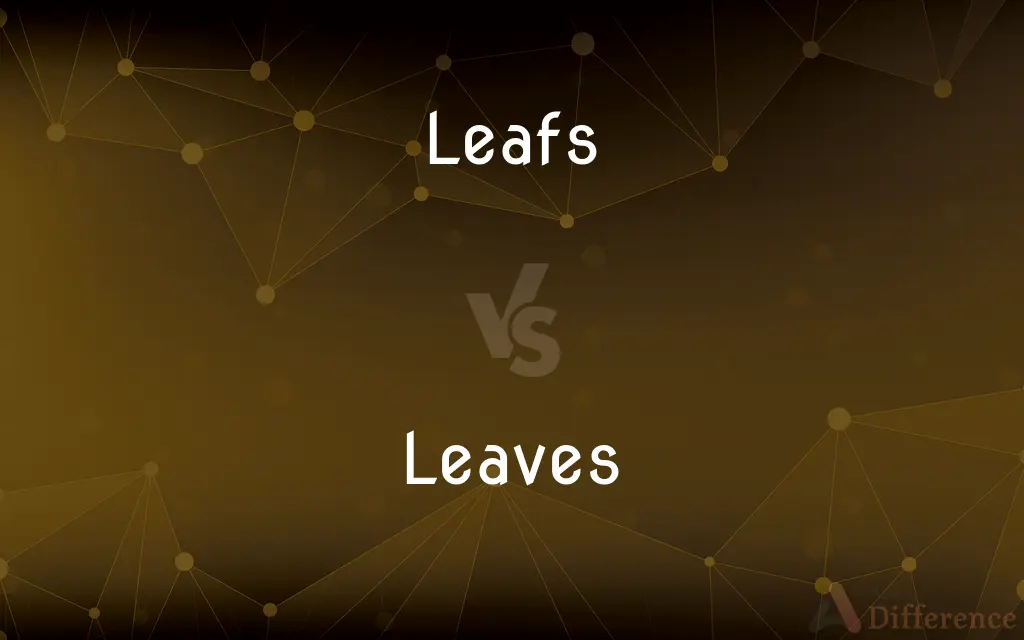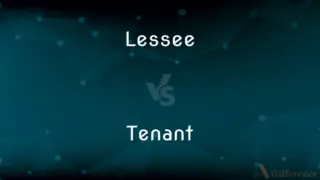Leafs vs. Leaves — What's the Difference?
By Fiza Rafique & Urooj Arif — Updated on March 29, 2024
"Leafs" is a less common plural form of "leaf," mainly used as a proper noun, like in "Toronto Maple Leafs," whereas "leaves" is the standard plural form used to describe more than one leaf from a plant.

Difference Between Leafs and Leaves
Table of Contents
ADVERTISEMENT
Key Differences
The word "leafs" is often recognized in specific contexts, such as names of sports teams or brands, making it a proper noun in such cases. On the other hand, "leaves" is the conventional plural form of "leaf," referring to the flat, green parts of plants and trees that are crucial for photosynthesis.
While "leafs" is relatively rare and typically not used in standard English grammar outside of proper nouns, "leaves" is widely used in both spoken and written language to discuss anything from botany to metaphors about change and growth. This distinction highlights how the use of "leafs" can be more about cultural or brand identity, whereas "leaves" aligns with grammatical norms.
The plural form "leaves" can be found in literature, scientific texts, and everyday conversation, showcasing the versatility and broad applicability of the term. In contrast, "leafs" captures a more niche usage that, while recognizable, does not conform to the pluralization rules typically taught in English language courses.
Understanding the difference between "leafs" and "leaves" involves recognizing both the grammatical rule for making plurals in English and the exceptions that arise due to names, titles, or trademarks. This encapsulates the dynamic nature of language, where standard rules meet the creativity of naming.
In educational settings, "leaves" is taught as the correct plural form of "leaf," emphasizing the importance of learning standard language conventions. Meanwhile, encountering "leafs" in the wild, such as in the sports world, serves as a practical example of how language can bend to accommodate unique identities or branding needs.
ADVERTISEMENT
Comparison Chart
Definition
A less common plural form of "leaf," mainly used in proper nouns.
The standard plural form of "leaf," referring to the green parts of plants.
Usage
Specific contexts, such as team names or brands.
General use in describing multiple leaf units from plants or trees.
Grammatical Norm
Considered non-standard except in proper nouns.
Standard pluralization form following English grammar rules.
Examples
Toronto Maple Leafs.
The autumn leaves fell gently to the ground.
Function
Identity or brand recognition.
Descriptive, used in scientific and everyday language.
Compare with Definitions
Leafs
Exception to pluralization rules.
Leafs defies usual English grammar conventions.
Leaves
Used in botanical contexts.
Photosynthesis occurs in the leaves.
Leafs
Seldom used in general English.
You rarely hear leafs outside of specific contexts.
Leaves
Follows English grammar rules.
Adding es to leaf makes leaves, the correct plural form.
Leafs
Recognizable in popular culture.
Leafs is instantly associated with the Toronto hockey team.
Leaves
Found in literature and poetry.
Poets often muse about the beauty of fallen leaves.
Leafs
Reflects brand or team identity.
The Leafs have a strong fan base.
Leaves
Standard plural of "leaf."
The tree sheds its leaves in autumn.
Leafs
Plural of leaf
Leaves
Symbolizes change or growth.
The changing colors of the leaves mark the seasons.
Leaves
Plural of leaf
Leaves
Plural of leave
Common Curiosities
What is the correct plural form of "leaf"?
"Leaves" is the correct plural form of "leaf" in standard English.
When is "leafs" used instead of "leaves"?
"Leafs" is used mainly in proper nouns, like the Toronto Maple Leafs.
Can "leafs" be used in formal writing?
"Leafs" should only be used in formal writing when referring to a proper noun, such as a team name.
Are "leafs" and "leaves" interchangeable?
No, they are not interchangeable. "Leaves" is used for general pluralization, while "leafs" is specific to certain names or brands.
Are there other words like "leaf" that change in the plural?
Yes, words like "knife" become "knives," following the same rule of changing "f" to "v" before adding "es".
Can "leafs" be considered correct English?
"Leafs" is correct only when used as a proper noun, otherwise, "leaves" is the grammatically correct plural form.
How do teachers explain "leafs" and "leaves"?
Teachers explain "leaves" as the standard plural form of "leaf," and "leafs" as an exception used in proper nouns.
Is it grammatically correct to use "leafs"?
In general English grammar, "leafs" is not the correct plural form except when used as a proper noun.
Do "leafs" and "leaves" have the same meaning?
They refer to the same base word but differ in usage; "leaves" is the correct plural, while "leafs" is used for specific names.
Why does "leaf" become "leaves" in the plural?
"Leaf" becomes "leaves" due to a common rule in English that changes "f" to "v" before adding "es" for plurals.
Why do some plurals in English change the letter "f" to "v"?
It's a rule to maintain pronunciation; changing "f" to "v" before adding "es" makes the word easier to say.
What is the significance of "leaves" in literature?
"Leaves" often symbolize change, growth, or the cycle of life in literature and poetry.
What lessons can be learned from the differences between "leafs" and "leaves"?
These differences highlight the dynamic nature of language and the balance between grammatical rules and cultural or contextual exceptions.
How do "leafs" and "leaves" reflect language flexibility?
The usage of "leafs" in names shows how language can adapt for identity or branding, while "leaves" adheres to grammatical norms.
How does the use of "leafs" in a team name affect its grammar?
In the context of a team name, "leafs" is grammatically accepted as a proper noun, showcasing an exception to standard pluralization rules.
Share Your Discovery

Previous Comparison
Lessee vs. Tenant
Next Comparison
Whelp vs. WelpAuthor Spotlight
Written by
Fiza RafiqueFiza Rafique is a skilled content writer at AskDifference.com, where she meticulously refines and enhances written pieces. Drawing from her vast editorial expertise, Fiza ensures clarity, accuracy, and precision in every article. Passionate about language, she continually seeks to elevate the quality of content for readers worldwide.
Co-written by
Urooj ArifUrooj is a skilled content writer at Ask Difference, known for her exceptional ability to simplify complex topics into engaging and informative content. With a passion for research and a flair for clear, concise writing, she consistently delivers articles that resonate with our diverse audience.














































